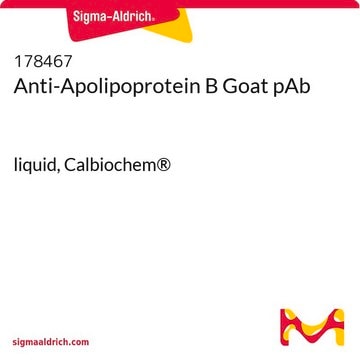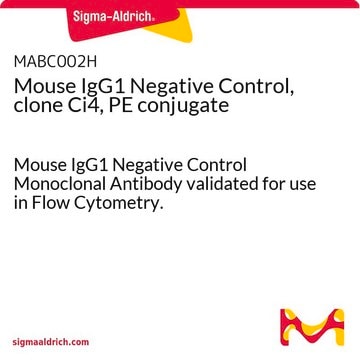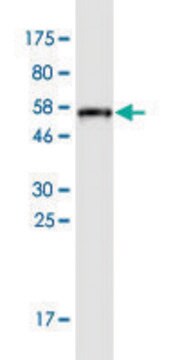178422
Anti-Apolipoprotein A-I Rabbit pAb
liquid, Calbiochem®
Sign Into View Organizational & Contract Pricing
All Photos(1)
About This Item
UNSPSC Code:
12352203
NACRES:
NA.41
Recommended Products
biological source
rabbit
Quality Level
antibody form
purified antibody
antibody product type
primary antibodies
clone
polyclonal
form
liquid
contains
≤0.1% sodium azide as preservative
species reactivity
human
manufacturer/tradename
Calbiochem®
storage condition
OK to freeze
avoid repeated freeze/thaw cycles
isotype
IgG
shipped in
wet ice
storage temp.
−20°C
target post-translational modification
unmodified
General description
Anti-Apolipoprotein A-I, rabbit polyclonal, recognizes human apolipoprotein A-I. Does not cross-react with other apolipoproteins. It is validated for ELISA and Western blotting.
Rabbit polyclonal antibody purified by ammonium sulfate precipitation and DEAE-cellulose ion exchange chromatography. Recognizes the apolipoprotein A-I protein.
Recognizes human apolipoprotein A-I. Does not cross-react with other human apolipoproteins.Antibody Target Gene Symbol: APOA1 Target Synonym: Ai, ALP-1, Apo1a, APOA-I, APOLIPOPROTEIN A-I, APOLIPOPROTEIN A-I G1, APOLIPOPROTEIN A1, Brp-14, HDLA1, LP(A-I), Ltw-1, Lvtw-1, MGC102525, MGC117399, Sep-1, Sep-2 Entrez Gene Name: apolipoprotein A-I Hu Entrez ID: 335 (Related Antibodies: 178474, 178472, 178470, 178463) Mu Entrez ID: 11806 Rat Entrez ID: 25081
Immunogen
Human
full length, human apolipoprotein A-I
Application
ELISA (≥1:800)
Immunoblotting (1:1000)
Immunoblotting (1:1000)
Packaging
Please refer to vial label for lot-specific concentration.
Warning
Toxicity: Standard Handling (A)
Physical form
In PBS.
Reconstitution
Following initial thaw, aliquot and freeze (-20°C).
Other Notes
Does not cross-react with Apolipoprotein A-II, B, C-I, C-II, C-III or E by immunoblotting. Variables associated with assay conditions will dictate the proper working dilution.
Legal Information
CALBIOCHEM is a registered trademark of Merck KGaA, Darmstadt, Germany
Not finding the right product?
Try our Product Selector Tool.
Storage Class Code
10 - Combustible liquids
WGK
WGK 1
Flash Point(F)
Not applicable
Flash Point(C)
Not applicable
Certificates of Analysis (COA)
Search for Certificates of Analysis (COA) by entering the products Lot/Batch Number. Lot and Batch Numbers can be found on a product’s label following the words ‘Lot’ or ‘Batch’.
Already Own This Product?
Find documentation for the products that you have recently purchased in the Document Library.
John T Melchior et al.
Journal of lipid research, 58(7), 1374-1385 (2017-05-10)
HDLs are a family of heterogeneous particles that vary in size, composition, and function. The structure of most HDLs is maintained by two scaffold proteins, apoA-I and apoA-II, but up to 95 other "accessory" proteins have been found associated with
Elias N Glaros et al.
Journal of lipid research, 49(2), 324-331 (2007-11-06)
The serine palmitoyl transferase inhibitor myriocin potently suppresses the development of atherosclerosis in apolipoprotein E (apoE) gene knockout (apoE(-/-)) mice fed a high-fat diet. This is associated with reduced plasma sphingomyelin (SM) and glycosphingolipid levels. Furthermore, oral administration of myriocin
Roshni R Singaraja et al.
Circulation, 114(12), 1301-1309 (2006-08-31)
Extrahepatic tissues have long been considered critical contributors of cholesterol to nascent HDL particles in the reverse cholesterol transport pathway, in which ABCA1 plays the crucial role. Recent studies, however, including both overexpression and deletion of ABCA1 selectively in the
W Sean Davidson et al.
Journal of lipid research, 57(4), 674-686 (2016-02-26)
HDL cholesterol (HDL-C) efflux function may be a more robust biomarker of coronary artery disease risk than HDL-C. To study HDL function, apoB-containing lipoproteins are precipitated from serum. Whether apoB precipitation affects HDL subspecies composition and function has not been
Sven Kinzebach et al.
BMC cell biology, 14, 48-48 (2013-10-31)
Multilineage differentiation, immunomodulation and secretion of trophic factors render mesenchymal stromal cells (MSC) highly attractive for clinical application. Human platelet derivatives such as pooled human platelet lysate (pHPL) and thrombin-activated platelet releasate in plasma (tPRP) have been introduced as alternatives
Our team of scientists has experience in all areas of research including Life Science, Material Science, Chemical Synthesis, Chromatography, Analytical and many others.
Contact Technical Service








